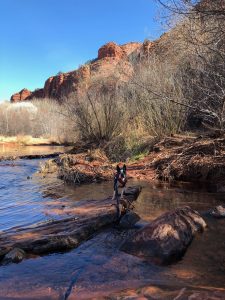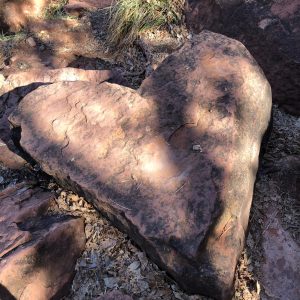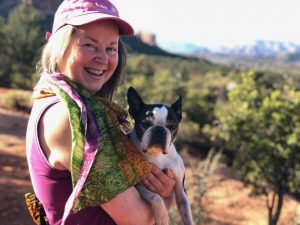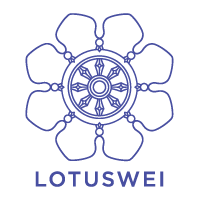Blog
The Beauty of Darkness
Dark chocolate, yes that too. But this blogpost is about the beauty of a dark night sky and the healing rhythms of nature. I’m on a year-long study of Circadian…
Dark chocolate, yes that too.
But this blogpost is about the beauty of a dark night sky and the healing rhythms of nature.
I’m on a year-long study of Circadian Biology, the powerful (and free) healing potential of aligning ourselves with nature’s cycles.
Every one of our 50 trillion cells has its own biological clock. If you have low energy, poor digestion, less than ideal sleep, headaches or immune issues your genes will respond favorably to getting enough natural sunlight. And just as importantly, enough darkness at night.
Try it for a week or two and see what happens. Greet the day by spending a few minutes outside at dawn and again at dusk. Turn off any unnecessary indoor and outdoor lights. The EMFs from static, artificial light causes an imbalance in our nervous system.
It was an eye-opener for me when my house was tested for EMFs. The lights in my kitchen gave off almost as much static as my wifi router. I replaced them with blue-blocking red bulbs and instantly felt a calmness in my body and my mind relaxed.
We can save money and improve our health with a few easy steps. Use motion detector lights rather than leaving outdoor lights on all night. Motion lights have been proven to create more safety for you than bright, static lights. Using light shields or replacing bulbs with warmer tones (yellow or red) is beneficial for you, your plants, the trees and the wildlife.
Remember how you felt the last time you watched a gradual sunset or sunrise?
To be in the rhythm of nature’s natural light is restorative to your body, mind and spirit. Give it a try and notice what you notice.
The Island Fringe Festival will have various performances over the weekend
Pamela on stage at Rochford Square in Charlottetown as part of The Island Fringe Festival.
CHARLOTTETOWN, P.E.I. – Pamela Ziemann of Seattle, Wash., performs a scene on stage at Rochford Square in Charlottetown as part of The Island Fringe Festival.
The Guardian
Published: Aug 04, 2017 at midnight
Updated: Sep 30, 2017 at 3:25 a.m.
The play, “If I were me… I’d know what I want” is a true-life story written and performed by Ziemann.
It’s about a farmer’s daughter reluctantly entering a Dairy Princess Contest while secretly wanting to be at an Alice Cooper Concert.
Ziemann will be performing this show again Saturday at 9 p.m. and Sunday at 4 p.m.
Other Fringe shows will also be going on this weekend as part of the festival.
The Island Fringe Festival is a site-specific summer festival celebrating independent art and alternative theatre and performance in downtown Charlottetown.
The festival gives local, Canadian, and international artists the opportunity to create and perform new theatrical works in unconventional venues throughout the city.
For more information and for a complete list of performances visit The Island Fringe Festival.
One-woman show puts Midwest’s farming values on stage
Pamela’s return to Minnesota and her relationship with her father Weldon.
By Erin Sommers pokyrdnews@gmail.com
Pamela Ziemann and her dad didn’t always agree on how he should approach farming.
Ziemann, who grew up on her family’s southern Minnesota farm in the 1960s and 1970s, left the Midwest after graduating from high school, settling in Seattle, where she pursued a career as an actress and playwright. She will bring her latest show, “These Roots Go Deep,” to the Rialto at 2 p.m. June 8. Freewill donations will be accepted.
The play looks at the question of how to reconcile her love and respect for her father when he made decisions for the farm that she thought were harmful to the environment. Ziemann started thinking about the show in 2015, right after her father died.
“At that time, I wanted people to know him,” she said.
Her dad, Weldon, was a fourth-generation farmer who was raising corn, oats, hay and soybeans on 380 acres when he won a county Outstanding Farmer Award. Ziemann said she and her dad disagreed on his decisions to use terminator seeds, about her preference for organic produce and her disapproval of the corporate turn of agribusiness. But she said she also understood why her dad made the choices he did.
“He would go with me to the food co-ops (on the West Coast),” Ziemann said. “We were connected, yet he always had this struggle — you have to make so much product to pay for the equipment.”
Farmers have big bills to pay, for inputs, for seed, for the equipment that kept getting bigger and bigger.
The show is peppered with details about Ziemann’s own experiences helping on the family farm, like when she and her siblings would walk the beans, looking for weeds, and how that job disappeared as agriculture changed. Ziemann wanted to tell her dad’s story, to show how he was more than just another Midwestern farmer who sold out to Monsanto, as people might have characterized him. At first, Ziemann looked into commissioning someone to write a play. That turned out to be more complicated and time consuming than she anticipated, so she decided to write the show herself.
“It is one of the most healing things I’ve ever done,” she said.
Performing the show on the coasts has also been incredibly rewarding.
“When I performed the show at Theater Row in New York City, a group of locals took me out for dinner after the show, commenting on the importance of this work,” Ziemann said. “The only information they had about farmers in the midwest was through the news which often pits people against each other.”
Her West Coast experience was similar.
“When I performed the show in Seattle, an audience member blurted out in the talkback how she loved my Dad,” Ziemann said. “Even though the people in that group promote organic farming, they empathized with the decision my Dad made about using inputs. When I performed the show in Grass Valley, CA (where it won Best of Fringe Award) audience members enjoyed hearing about my relationship with my Dad and how farming has changed over the years.”
Ziemann loved her dad, even when they didn’t see eye to eye.
“He was like my superhero,” she said. “He was generous. He loved the land.”
She arrived back in Minnesota a few weeks ago to prepare for the show in Pocahontas, and rehearsing in the living room of her childhood home has brought a new dimension to the experience, she said. Writing the play and looking back through her memories has also given her new insights into her dad.
Take the part of the show in which her dad comes to talk with her after her dog died. Ziemann said she initially only thought about her dad’s comment, that the animal was only a dog. As an adult, she saw the situation differently.
“He saw me at the dinner table,” she said. “He followed me (to the bedroom). He had all this love. I got past the words. When I walked like him (in preparing for the role), it was a completely different feeling than remembering the words he said.”
She sees a broader message in that experience.
“Living in this fast-paced society, it’s more important than ever to slow down, breathe and feel,” she said. “Media pulls us in so many directions telling us what to think, who’s right and who’s wrong and what we need to do to survive, that it’s easy to lose our sense of self. … It’s important to take the time to hear each other’s stories and turn off the news. We have more in common than we might think. It comes down to operating out of love instead of fear.”
Do You Believe in Magic? My Journey back to My True Nature
Do You Believe in Magic? That song plays in my head as I think about Leonard Olson. The short little guy with white hair and a white beard whose character…
Do You Believe in Magic? That song plays in my head as I think about Leonard Olson. The short little guy with white hair and a white beard whose character delights audience members in my one-woman show “If I Were Me… I’d Know What I Want.” He looks like a gnome in overalls straight out of a children’s book.
I met Leonard on April 12, 2016 on my 58th birthday. (I was born in ’58, makes it my magical birthday)
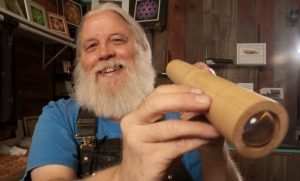
My brother Bruce and I stumble into his enchanting Kaleidoscope Factory in the small town of Pocahontas, Iowa. Surrounded by CAFO’s (Concentrated Animal Feeding Operation) and field after field of genetically modified corn, this beacon of light is filled with kaleidoscopes, wooden labyrinths and magic pixie dust dispensers. A sign on his wall reads “It’s really hard not to smile when looking through a kaleidoscope.” He peaks over his elf-like glasses while making an egg-shaped kaleidoscope on his lathe. Catching the twinkle in his eye, I know this is no tourist trap selling over-priced trinkets. This guy’s energy attracts me like a moth to a bright light on a dark night. His voice bypasses my mind and speaks directly to my soul with wisdom, playfulness and imagination.
I’m not an impulse buyer, but today my adventure-starved inner child demands I buy the teleidoscope, labyrinth and magic pixie dust dispenser. A teleidoscope is so cool like a multidimensional view of whatever you want to look at. No presets like in a kaleidoscope but faces and pictures and ceiling fans. The possibilities are endless.
There are a lot of kaleidoscopes and teleidoscopes, but just one magic pixie dust dispenser. Bruce’s inner child must have been starving even more than mine. He picks it up when I’m not looking and adds it to his collection of purchases. I feel like a little kid who had their favorite toy taken away. In between my disappointed sighs, I take a picture of it to capture a digital bit of magic. I even whisper to it on the drive home, “I’m so sorry he got to you before I did. You obviously belong with me.”
Fast forward a year and a half. I call Leonard to see if he remembers me. Not only does he remember me, he offers to rent a local theater and give me 100% of the donations if I perform my show in Pocahontas. The only day open in my schedule is August 29th.
Curiously, that’s the exact day, the 20th anniversary of his heart attack. He quips, “I can’t think of a better way to commemorate this anniversary than being acted out in your one-woman show.” He attributes his survival to leaving the corporate world to do what he loves.
After a lifetime of hearing what’s not possible, I’m believing in magic again. Why did everything align to allow this to happen? Leonard graciously promotes the show far and wide. How does the local paper get my promo picture on the front page with such little notice? I change my flight from Seattle to Chicago Fringe Festival stopping in Iowa on the way. No fee and the weather looks ideal.
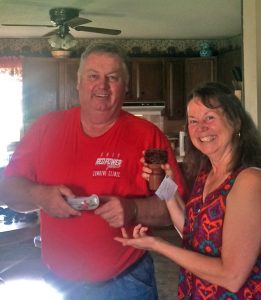
As if all this isn’t magical enough, my brother (who knows nothing about the content of the show) asks me if I’d like to have his magic pixie dust dispenser. He’s giving it to me! This comes out of the blue the night before the show. He and his family live in southern Minnesota so they all pile in the car to make the trip to Pocahontas. He’s going to hear how much that magic pixie dust dispenser means to me under the bright lights of the Rialto Theater.
Ironically, some of my teenager lines from the show parallel what my niece and nephews are experiencing now. After the show, my 15 year old nephew says he no longer feels obligated to do what society expects of him. Comments like his remind me why I wrote and continue performing this show. It gives deeper meaning to Emerson’s quote 15 minutes into the show, “To be yourself in a world that’s constantly trying to make you something else is the greatest accomplishment.”
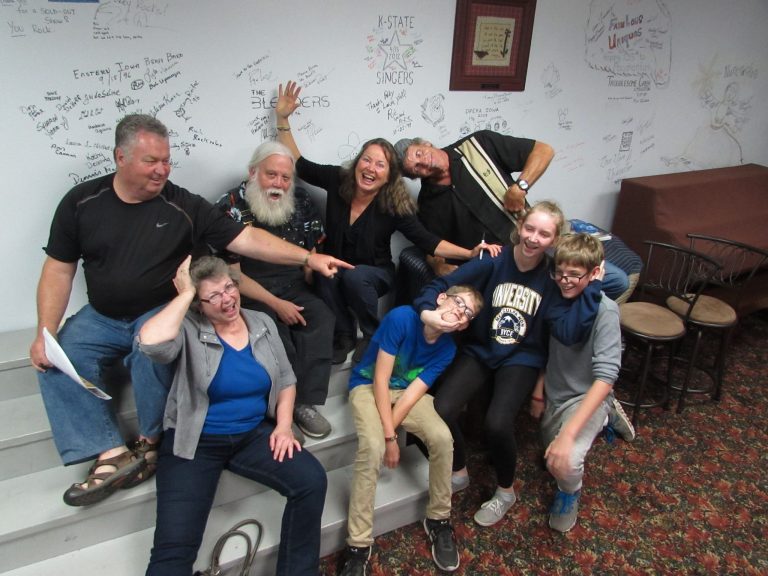
My college boyfriend from 35 years ago knew me as the shyest person on campus. He drives up from Des Moines to witness me act out 12 different characters in my hour long show. I’m being true to myself now and doing what I love. He tosses a $50 bill into the donation jar. The money’s nice, but redeeming myself after all these years is priceless.
Could this magic be happening because Leonard and I are basing our decisions on intuition?
Leonard is an authentic guy who walks his talk. After tech rehearsal he drives me to his nature conservancy a few miles from the Kaleidoscope Factory. The land is wild and free.
He inherited this land and rather than allowing genetically modified corn to be planted there he decides to let the land rest. He explains that if 10% of the farmland in Iowa is allowed to be natural without using chemicals, we could stop the nitrate damage fueling the ever growing dead zone in the Gulf of Mexico. At first glance his land may offend some. It looks a bit unruly. The neighboring farms have pristine rows of corn planted by computer to be exactly the same distance apart. Because of routine spraying of chemicals, there’s not a weed in sight on their land. Leonard’s nature conservancy has weeds. He explains the basics of permaculture and how weeds can be beneficial to the health of the soil. He believes in biodiversity with plants and with people.
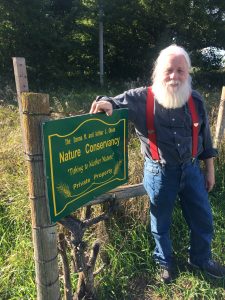
Like Leonard’s nature conservancy project, our own true nature may offend some. I remember clergy and high school teachers reprimanding me when I dared to share my true nature. (Nothing vulgar or disrespectful, just my unique creativity) I felt controlled and modified. How often do we suppress our own natural talents to get approval or acceptance? How often do we do it to others? “If I Were Me… I’d Know What I Want” is my 50 year journey coming back to my true nature. It’s about being real. It’s about sharing our truth. I get glimpses all the time now that the more we tap into our natural authentic selves, the more magic appears in our lives.
Healing Past, Present and Future Generations
I used to think healing was purely physical. Now I feel the depth of emotional healing possible for myself, audience members and generations of women in my family because of…
I used to think healing was purely physical. Now I feel the depth of emotional healing possible for myself, audience members and generations of women in my family because of my one-woman show.
I’ve had experiences in my life that left me ashamed, angry, annoyed. I feel better when I identify them and use them like compost to grow something better in my life. One of these times was when I entered a dairy princess contest I had no interest in. The thought of public speaking and being judged paralyzed me with fear. The thought of drinking milk repulsed me.
My mother regretted not standing by my side as my dad, a dairy farmer, persuaded me to enter the contest on the very night my hero, Alice Cooper was playing in concert. It was my 18th birthday. I still longed for my dad’s approval so I entered the contest turning my back on my true passion. 40 years later I told Mom I’d be acting out that scene in my one-woman show “If I Were Me… I’d Know What I Want.” She cringed asking “Why can’t we just sweep that under the rug and forget about it?”
Sweeping what we’d rather not see under the proverbial rug was habitual for my family. The disgusting thing may be out of sight, but everyone still felt it.
Acting out that embarrassing experience in my own way, on my own terms under stage lights was liberating. Like a clean slate. It ended up liberating my mom from her regrets from the past as well.
I heard the sweet sound of her laughter in the audience as I performed the first 15 minutes of my show on stage in my Minnesota home town.
During the next year, I continued writing the hour-long show, rehearsing scenes for Mom as she lay in a hospital bed recovering from multiple myeloma chemo treatments.
To act out characters, it’s essential to know their back story. I remember reading to her what I thought was her back story… what it was like growing up the youngest of ten children, why she got married, how she felt about sex, what her favorite moments in life were. With one nod of her head she said, “Yes. You read me correctly.”
I’d ask her feedback on how well I played out my dad, brother and sister. Running low on energy she still wanted to help, suggesting how Dad would talk faster, my brother slower. I recorded her saying a couple of her lines. We both knew she was running out of time. I wanted to remember her vocal pacing and intonations. One night, she surprised me as she came around the corner in her walker. She mustered up the energy because she wanted to know more about my broken engagement that’s part of the show. She was curious what I really wanted out of life. I wasn’t clear. That’s how my show ends and I still needed to do work on that.
Grateful for a platform to share untold stories, I welcomed her comments and questions. She never got to see the full play on stage but did see me rehearse many times. As fate would have it, she took her last breath the morning of my debut at Seattle Fringe Festival.
It was surreal acting out her character that night. I was numb. My first few lines on stage lingered in the air for a few seconds, then felt like they dropped into a void. I wasn’t sure what I was feeling but once I got the first lines out, the rest came as rehearsed and I completed the show. There was applause. There were moments of insights. There was death. And life went on.
Less than six months after her passing I get an intuitive nudge to scatter her ashes at a small lake where she used to play with her sisters. Originally, I planned to take them to Prince Edward Island where I was performing. It would have been meaningful as we spent time there together, but her hometown lake was calling stronger.
I changed my flight to stop in Iowa before the Chicago Fringe Festival. Driving to the lake, I talked with the campground attendant and discover the dam (now called a spillway) where the water flows over to the most peaceful pond I’ve ever seen. I was surprised Mom had never taken me here, but it was just as she’d talked about. I’m by myself in nature and feel her little child’s energy. Laughing and full of life. My heart opens as I take in the sounds of trickling water and a solitary bird. The leaves gently sway in the wind and I feel connected with everything. The numbness is gone and I’m feeling again. Peaceful, happy, content.
The next day I perform my show at the Rialto Theater in Pocahontas, Iowa. Mom’s 16 year old granddaughter is in the audience. At the end of the show, she gives me a tight hug, lets out a big sigh and tells me she feels like a human being again. I’m not sure why she said that but somehow everything feels like it’s going to be ok.
Before I fly out I have a chance to take my niece to the pond where I scattered mom’s ashes. We talk about her grandmother (my mother) and feel the feminine power that has been passed down. It’s running through our veins. We’re all connected by an invisible, benevolent force.
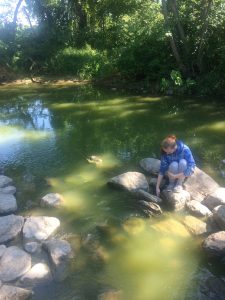
This force is with me on stage every time. Performing a one-woman show allows me to play out family members, understand them better and see life through their eyes. The stage is a safe space that invites dialogue after the show. It allows me to fully express myself and be seen. I’ve experienced much emotional healing by sharing my story. Old wounds of feeling misunderstood, unseen and unworthy. Perhaps these wounds have been in the family for generations. And perhaps they would continue if they’re not addressed.
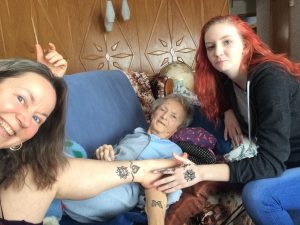
We all have stories. My niece commented how she’d be so afraid to act on stage. Then she realizes that I was probably afraid at her age too. This is true. Now, to be a positive influence for her means the world to me. That, along with the memory of my mom’s laughter in the audience comforts me knowing the pain she felt so many decades ago was released.
Emotional healing is an individual endeavor, yet we can help those we love by expressing our unique creativity. For me, this path has been writing and performing my show “If I Were Me… I’d Know What I Want.” I couldn’t do it without believing in myself and my message. I also couldn’t do it without the help of others, those who have gone before me and shine a bright, steady light.
Family, Flesh, Blood and Strangers. Can you tell the truth?
My Dad was a family guy. He’d entice his grandkids to go with him on the most mundane errands just to be able to spend more time with them. He…
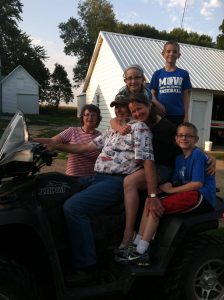
My Dad was a family guy. He’d entice his grandkids to go with him on the most mundane errands just to be able to spend more time with them. He and Mom regularly ventured cross country to visit dozens of relatives. He loved being with his family yet that fateful night in a hospital room after unexpected complications, he died alone. In the hospital with strangers.
But no one was really a stranger to him. He was curious about people, few crossed his path without a shared smile and some friendly banter. I like to think that he crossed over surrounded with the love of kindred spirits.
We often think of family as a husband, wife and their dependent children. Another definition is a human family, those who come from one common source.
Universal source was a theme in a personal development course I was involved with in the 90s. Dad went with me one weekend. When the trainer asked him what he’d really like to achieve in life there was no hesitation. He quickly replied, “I’d like to be able to communicate with my son.”
That struck me. Here’s a guy who can communicate with almost anyone, yet yearns to connect more deeply with his own flesh and blood. He often said, “We’re here to help each other. Maybe I can connect with someone else in a way their own family members can’t.”
He certainly did that.
Dad may have been with me in spirit a few nights ago when I went to Office Depot. Like so many other times, I’m nonchalantly cutting flyers for my upcoming show. There’s a guy next to me with beautiful prints laid out on the counter of his custom homes. He’s a builder who just moved to my small town in Washington. We strike up a conversation that evolves into how he and his wife have done so much for his son and now his son isn’t speaking to him. I could feel his heartbreak as he spoke about not being able to see his newly born grandchild. He wondered why there was such a disconnect, what he might have done differently. He apologized for sharing such an intimate story with me, a stranger. Then I told him how my Dad had done so much too. He helped my brother get started farming and was with him every step of the way. He was constantly offering advice and pointing the way to the best deals. I wondered out loud if both my Dad and my new friend might have done too much for their sons? Was it conditional? Did they expect something from their sons in return after giving so much? Maybe sons of over-giving fathers are here to teach them about self-responsibility and unconditional love.
I don’t know. I certainly didn’t have answers for him, but it felt good to share.
He thanked me, told me he didn’t feel so alone anymore. That meant a lot to me. My mission in performing my one-woman show is to connect with others so we don’t feel alone. I gave this stranger a flyer to my next show. We both smiled, knowing we’d meet again after the show.
Even though I can’t see my Dad anymore, I feel his energy. After performing my show in a small farming community in Iowa, I was in the lobby and heard a melody. In the middle of popular songs, there it was. I cocked my head putting attention on it while people talked and laughed about the show. It was a meditation titled Graceful Crossing that I played for my Dad in 2015 the last two weeks of his life. I also played it at the funeral home when I was alone with his body. Hearing that same melody at the end of my show felt like him connecting and applauding. I felt a wave of peace come over me. Every cell of my body resonated with this miracle happening at the perfect time and place.
Times like this are a precious gift, yet there are many times I still feel alone. Wishing I could be more honest and vulnerable in my conversations with others. Wishing I’d connect more from my heart than my head. Performing my one-woman show challenges me to tell the truth. When I anticipate how family members or even strangers may react I feel myself shrink and hold back. I reflect on my favorite actors and why I’m attracted to them. I know I have to be honest and express myself fully on stage. Then it will be interesting, memorable and perhaps change lives. There’s a constant risk in offending others when I expose my truth, but closing myself off in hopes of staying ‘safe’ also shuts down possibilities of true connection with the ones who are open to it.
I’m going for it.
To be Seen or Not to be Seen. That is the Question
The last few days of September are picture-perfect on the Olympic Peninsula. I want to sleep in my new van, test it out for an upcoming road trip before winter…
The last few days of September are picture-perfect on the Olympic Peninsula. I want to sleep in my new van, test it out for an upcoming road trip before winter arrives. There’s one more night of warm temperatures and I’m going to make the most of it.
Hurricane Ridge is located in the majestic Olympic National Park. Last year I slept at the five thousand foot peak with my friend in his van. It was a silent, starry night. We woke up to an expansive red sunrise over snowcapped mountains. The kind of morning that makes you want to live forever. We slept out there on a whim, but this time I decide to check in at the visitor center.
Disappointedly, I learn the rule is that you can park your car up there, but you can’t sleep in it. You can backpack out a few miles but not with a dog. My dog’s in the car, she’d have to stay in the van in the parking lot. I understand about not taking dogs into the back country, but confused why I can’t sleep in my van too. I yearned for the simple, beautiful night I had before. It was easy. I was unseen, oblivious to the rules and no damage was done.
Now that I showed up, my dream isn’t going to happen. I get back in my van, muttering spiteful comments to that park ranger, feeling like a defeated teenager.
Heading home, I remember it’s the same night the Jamestown Tribal Library is hosting the documentary of Elouise Cobell’s thirty year fight for the mismanaged Indian Trust accounts. Before I know it, I’m sitting with a group of people who also feel downtrodden. There’s a resonance in the air. I feel relaxed and inspired chatting with some old friends before the show starts.
In the film, there’s a scene describing the sacred Native American custom of tree and scaffold burials. After the film I ask if this custom is still happening. The First Nation representative comments that there’s one tribe on Long Island that’s still unrecognized by the Federal Government. Because they’re not recognized, they don’t fall under Western funeral rules and can bury their dead however they want.
In that moment I realize why I opted to be invisible much of my life. If no one sees me, I don’t have to follow their rules. No ones tells me what’s right and what’s wrong. I follow my own guidance.
My challenge is to keep following my guidance even when I feel vulnerable to powerful outside forces.
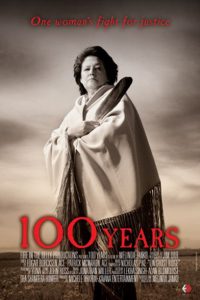
Elouise Cobell did that. A soft-spoken treasurer for her Montana tribe, she discovered a trail of fraud. When she brought it to the government officials’ attention they ridiculed her, telling her she didn’t know what she was talking about. She almost gave up, but her intuition nudged her to keep going. She showed up at each hearing, refusing to be invisible. Knowing her tribe members were getting five cents on the dollar compared to what the white people were making gave her the impetus to make some noise. Five cents wasn’t enough.
Brings to mind the phrase I’ve heard over the years… give them just enough to keep them happy.
President Lyndon B. Johnson said “These Negroes, they’re getting pretty uppity these days and that’s a problem for us… We’ve got to give them a little something, just enough to quiet them down.”
Marginalized groups have been and still are denied normal privileges of a society because of perceived lower social status. Privileges can also be denied because people don’t know their worth and they don’t stand up for themselves. In many cases, larger group dynamics set the standards of worth. A group can even be your own family.
I had a wonderful family, my Mom and Dad were gems. But growing up on a farm where hard work was the most valued, my contribution of sensitivity didn’t feel like it added any value at all. It was even a hindrance like when we were supposed to cut chicken’s heads off and other farm chores.
My self-confidence was non-existant. I had no idea my sensitivity could actually be a gift in the right environment.
While my family enjoyed the midwestern sun, I needed to shade myself from the heat. When they played loud games of softball, I needed the solace of my quiet bedroom. I felt like I was living on the periphery of my family unit.
Many of us have specific marginalized groups we want to help like Save the Whales, LGBT, Prisoners, Native Americans, Black Lives Matter and so many others. I’ve always had a propensity to help the underdog but later discovered the best thing for me to do is to become my own alpha dog. When I’m there for myself, honoring and expressing my unique talents, then I can truly be there for others.
To show up can feel risky, but what’s the alternative? Hide? Play small? Playing small can feel safe at times, but it also makes us a pawn in someone else’s game.
It’s time we create our own games. My one-woman show is my 50 year journey as I search for and find my voice. I choose to be seen and want to see you there too.
What I Learned from a Shoeshiner: How to Build Character
I’ll admit. I wasn’t looking forward to going to New York City. All the people, the traffic, the noise. Surprisingly the first person I spot on W. 47th Street is…
I’ll admit. I wasn’t looking forward to going to New York City. All the people, the traffic, the noise.
Surprisingly the first person I spot on W. 47th Street is the shoeshine guy from the documentary called Shiners. He was one of the main characters in the film I’d seen at the Port Townsend Film Festival a week before.
Suddenly I’m enjoying the noise, the traffic, the people. Listening to Don, the shoeshiner calling out to people walking by, “Hey Miss, I can’t do anything about your hair, but I can help you with those shoes.” “Hey Mister, let me do what I do best. Your shoes are crying for a shine.”
He explains to me that in this bustling city he’s got 3 seconds to build rapport with pedestrians. If he doesn’t make a connection quickly, it’s too late. They’re gone that quickly. He’s got to size people up… which ones are open, which ones are closed. It’s not possible to reach everyone, but a clever phrase might just entice someone to play.
3-2-1. That’s all he’s got. I experiment to see if I can connect with him in 3 seconds the next morning.
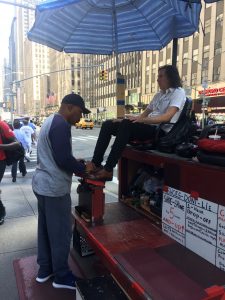
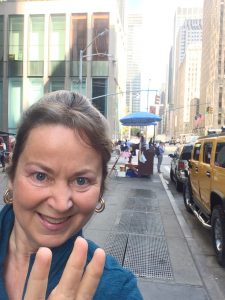
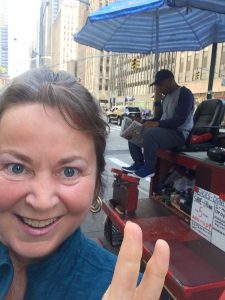
Me: “Hey buddy, what’s so interesting in that newspaper you’re reading?”
Him: “They’re putting cocaine in McDonald’s french fries.”
Me: “Now that’s a happy meal!”
We both smile. I keep walking.
Before hearing about his theory on connecting in 3 seconds, I would have passed on this opportunity to connect. I might say to myself that he’s reading a paper. Leave him alone. Why would he care about me?
Or I can reach out and connect with a fellow human being.
This simple interaction teaches me a metaphor for life. We only have so much time. People come in and out of our lives. We can’t connect with everyone in the world, but we can connect with some. We can make an effort to find commonalities, play together and enrich each other’s lives. If we keep our hearts open, we’ll be ready for the next encounter.
Shoe shiners polish peoples’ shoes, giving them a boost in confidence. Most of us feel better about ourselves by taking the time to look the best we can. There’s something commendable about that.
Yet, no amount of polish on the outside can make up for an unpolished interior life.
We each have a sparkle inside of us that may have been stained over the years. Well-meaning teachers, parents or clergy spread their beliefs of lack and limitation on us just as it’s been done to them.
There’s a line in my one-woman show If I Were Me… I’d Know What I Want where I say, “It was my time to shine!” It’s there to remind us to be the light, creative and free beings we were meant to be, expressing ourselves honestly and authentically.
People are constantly coming in and out of our lives sharing experiences. Sometimes difficult ones. Like the time I innocently followed my fiancé to live in Indonesia. He began a successful career. I entered the dark night of the soul. It was a hard time, but without it I wouldn’t have learned the value of self-love.
By keeping our hearts and minds open, we have an opportunity to build character and deepen empathy. We can use these lessons for good.
We can polish ourselves from the inside out.
Claiming my Crone dom
As I age, I realize there are no accidents and everything happens for a reason. Last winter I told myself I’d get away to someplace sunny and warm for a…
As I age, I realize there are no accidents and everything happens for a reason.
Last winter I told myself I’d get away to someplace sunny and warm for a few months and that’s exactly what’s happening.
My show If I Were Me… I’d Know What I Want was chosen to be part of the Tucson Fringe Festival on January 12th and 13th. I drove away from Sequim, WA on January 1st deciding to combine this adventure with a vision quest of sorts. Claiming my Cronedom.
Since I’m turning 60 when I get back I’m claiming the wisdom of my age, rather than feeling like a victim of it. In many circles, the word crone has taken on a negative connotation. Merriam-Webster defines crone as a cruel or ugly old woman. The original meaning of it
(and one I choose to embrace) is from CroneCounsel.org below.
Crone, hag, and witch once were positive words for old women. Crone comes from crown, indicating wisdom emanating from the head; hag comes from hagio meaning holy; and witch comes from wit meaning wise. Crones, hags, and witches frequently were leaders, midwives and healers in their communities. The meanings of these three words, however, were distorted and eventually reversed during the 300 years of the Inquisition when the male-dominated church wanted to eliminate women holding positions of power. Women identified as witches, who were often older women, i.e. crones and hags, were tortured and burned, and the words witch, crone, and hag took on the negative connotations that continue in our language. The Crone Movement, however, is re-claiming the positive meanings of these words.
The Crone began re-emerging into our consciousness in the early 1980s, and today many older women are embracing this connection. We are tapping into the ancient crone’s attributes of wisdom, compassion, transformation, healing laughter, and bawdiness. The ancient crone archetype strengthens our belief and confidence in age-accumulated knowledge, insights and intuitions enabling women to stand up for their rights.
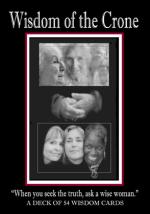
Everyday on this trip I’m randomly choosing a card from Wisdom of the Crone card deck and making a short video about the theme of the card. There are 54 cards, about the length of my trip. Follow along the adventure starting with day number 1 at my youtube channel by clicking here.
I’d love to hear your thoughts and comments.
Let Go. Choose a Better Path
Years ago, I bought an organic t-shirt for my Dad. We were in a food coop together when he saw it. I could tell he liked it. It was next…
Years ago, I bought an organic t-shirt for my Dad. We were in a food coop together when he saw it. I could tell he liked it. It was next to some that were half-off. He was tempted, but didn’t buy it. When he went to buy food at the deli, I grabbed it and secretly paid for it. Turns out it wasn’t half-off, but I bought it anyway. He loved that shirt, commenting over the years how soft it was. How good it felt. What a good deal it was.
When he died, I took his shirt back with me to Washington. It was, after all, organic. It did feel good. I couldn’t bear to let it go.
Now I’m traveling with my show If I Were Me… I’d Know What I Want spending time in Arizona. I decide it’s time to let it go. I packed it with me on a hike to Cathedral Rock in Sedona, a heart-opening vortex. I laid it on a rock, blessed my Dad for all the good he brought into my life. I also acknowledged some of the dysfunction in our relationship.
Many times I felt invisible. Like he didn’t see me for who I was. I thought out loud with a bittersweet realization… I paid full price alright. But it wasn’t the money that came to mind. It was a feeling of sacrificing myself to be who he wanted me to be. If he knew the price I paid, he wouldn’t have wanted me to sacrifice that much.
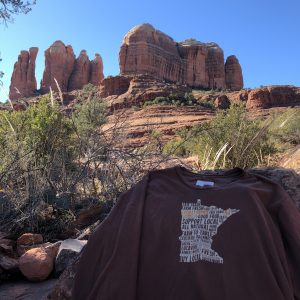
Making this connection brought me a great deal of peace.
The moment I laid his shirt on the rock, I realized how I’ve replayed this pattern in love relationships, including the one that ended the day before.
I see the pattern clearly. I notice a spring in my step with hopes of finally getting my next relationship right. Awareness is everything.
A guy zips by me on his mountain bike gleefully asking, “Do you like the trail we created for you?”
I smile to myself, “Actually I don’t like the trail you made for me.” It’s time to make my own path! Trust that I deserve to be loved for who I am, not who someone else wants me to be.
Letting go of a pattern that had been with me for over 50 years felt scary. I sat by the creek forgiving myself for all the times and all the relationships where I hadn’t revealed my true self so that I could be accepted by whatever man was in my life at the time.
When I left the creek to walk back to my car, my next step was this rock.
Stepping onto that heart-shaped rock I knew everything was going to be ok. My heart is strong. My heart is beautiful. I deserve a healthy relationship where I’m safe to be myself and seen for who I truly am.
